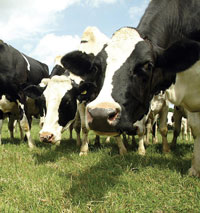Genomics to make selection of young sires easier

In January genomic information was included in the country of origin proofs of most USA sires – both progeny tested and young sires – marking a significant change of policy for the United States Department of Agriculture, which could have far reaching effects on UK users of USA genetics.
Until now, the USDA has held back from allowing breeding companies to use the information for commercial gain, but it now feels confident that the volume and depth of data is sufficient to add extra value for the benefit of breeders and producers.
Brian Garrison, leading USA sire selector for Select Sires – one of the studs supplying sires to UK producers via World Wide Sires – has no doubt about the value of genomics in bull proofs. “Genomic information is a valuable extra tool. It tells us a great deal more about young sires, and producers can use young bulls before they have progeny test information with far more confidence. It will alter the marketing of young bulls,” he explained during a recent visit to the UK.
But Mr Garrison warns against the misconceptions surrounding genomics. “Producers shouldn’t get carried away with it. It’s not a replacement for progeny testing – certainly not in the USA – and there will be no cut-back in the number or quality of progeny tested bulls we test in the USA and make available to UK producers through World Wide Sires.”
Where Mr Garrison really sees the value is in selecting young bulls. “We have already shown that our current top ranking progeny test sires in today’s stud match their ranking on genomic information five years ago when they were just going in to the testing programmes.
“By using genome test results at this early stage we can better match potential sires with our requirements. We won’t take on any fewer, but we can certainly lift the genetics bar in our selection process.”
As a result, Mr Garrison is confident that better young bulls will be on offer and, as a stud, they will be looking to collect more semen from potential high fliers. “This should mean supply will better match demand for top bulls and make them more available to producers. Even though the UK hasn’t yet got conversion formulas for genomic information, its producers should still reap the benefits.”
And there’s also great value in genome information for low reliability traits like longevity, cell count and fertility where it takes much longer to get high reliability from a progeny test say than for production and by which time the sire has often passed its peak profile.
“These traits, that support cow health and welfare, are getting more and more important to producers, milk buyers and consumers. There’s no doubt the inclusion of genomic information here will help improve our dairy populations in these important areas.”
